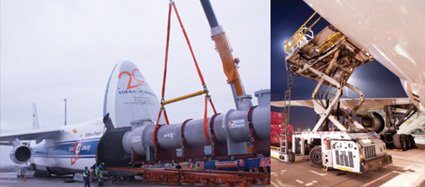
Clawing Back a Share of Africa's Air Cargo MarketAnnually 47 million tonnes of goods are transported globally as air cargo, and Dube TradePort Corporation is determined to capture a greater share of the African air cargo growth. The organisation’s persistence, during the past three years to open African skies to KwaZulu-Natal’s air cargo, is paying dividends. First there was Emirates, a daily passenger and cargo flight to Dubai, then an agreement with South African Express and Air Mauritius and now newcomer, Khuphuka Kings Airways has announced its introduction of cargo flights to Zambia and the Democratic Republic of Congo. And more routes are on the cards. Khuphuka Kings Airways will fly two ILyushin 76 aircraft, capable of carrying 46 tonnes of cargo and one Antanov – AN12 aircraft, capable of carrying 20 tonnes of cargo. These aircraft provide sufficient carrying capacity to transport any cargo into Africa. Kenya Airways, in its global planning, has scheduled a route to Durban for the 2016/17 financial year.
These achievements are challenging South Africa’s air cargo status-quo. “We are starting to see increasing interest in the direct routes to Africa from Dube TradePort, especially from cargo owners and exporters. Business is asking questions about why cargo needs to be transported to Gauteng when it can be freighted from KwaZulu-Natal.” Africa is acknowledged as the world’s second-fastest-growing region and, according to McKinsey and Company, poverty in Africa is falling, while around 90 million of its households have joined the world’s consuming classes - an increase of In the past year this was the only region in the world, other than the Far East, where air cargo has shown substantial growth. According to the International Air Transport Association’s (IATA) 2012/13 Annual Report, airfreight flows within Africa saw one of the strongest expansions, followed by trade lanes between Africa and the Middle East and Asia. According to the report, robust economic growth and investment in these regions and the recent development of new trade lanes on an extended version of the central Asia market assisted in boosting regional airfreight flows in 2012. “We will focus on this growth on our doorstep in terms of growing cargo and passengers to and from KwaZulu-Natal,” says Petko Atanassov, Dube TradePort Corporation’s Senior Manager: Cargo Development, Operations and Security. This is far easier said than done. During the 2012/13 financial year, air cargo volumes at Dube Cargo Terminal shot up 36%. Volumes on the main Durban-Dubai route were 8% below budget during the 2013/14 year and are expected to remain at this level until 2015. Nevertheless revenue for the year ending 2014 is up 23%. Key to success is breaking existing perceptions within the industry and finding alternatives to the formation of tight alliances between major carriers. Dube TradePort Corporation’s clearly defined cargo strategy focuses on attracting non-alliance airlines to fly dedicated air-freighters from King Shaka International Airport, creating specific cargo routes and providing local business with efficient time and price-sensitive air cargo opportunities, thus bringing the rightful air cargo share to the Province. Currently Dube TradePort Corporation has 21% of the perceived KwaZulu-Natal air cargo market. Close to 80% of the Province’s air cargo is freighted through OR Tambo International Airport because of KwaZulu-Natal’s lack of air connectivity, especially to sub-Saharan Africa. This puts businesses in KwaZulu-Natal at a disadvantage in terms of both time efficiency and higher logistics costs for import and export cargo, which must be trucked, flown or railed to OR Tambo International Airport. Local products become less competitive, creating a case for business to relocate to Gauteng which, ultimately creates a disadvantage for economic growth and job creation in KwaZulu-Natal. The enormous growth in passengers from KwaZulu-Natal on Emirates is also an example of people voting not to pay the cost of the additional travel leg to Johannesburg to connect to international flights. The focus on air cargo is not being undertaken at the expense of increasing passenger numbers. Rather, the thinking, says Atanassov, is to seek routes which could, in future, be converted to mixed-use operations, including passengers, which would be an added advantage for the Province in terms of business travel and tourism. In a scenario where global economic growth is strengthening, powered primarily by robust emerging markets, aviation’s role as a catalyst for economic growth has never been clearer. Developed economies desperately need economic growth. It is the only way out of the fiscal crises they face and aviation is a critical link to facilitate trade with economies that are expanding, says the IATA. In KwaZulu-Natal, Dube TradePort Corporation is driving this critical air connectivity.
|
